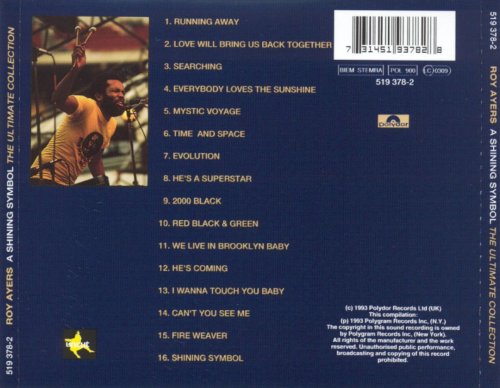
The album, meant to raise awareness and funds in support of the AIDS epidemic in relation to the African-American community, was heralded as "Album of the Year" by Time Magazine.ĭuring the 2000s and 2010s, Ayers ventured into house music, collaborating with such stalwarts of the genre as Masters at Work and Kerri Chandler.Īyers started two record labels, Uno Melodic and Gold Mink Records. In 1994, Ayers appeared on the Red Hot Organization's compilation album Stolen Moments: Red Hot + Cool. In 1993, Ayers appeared on the record Guru's Jazzmatazz Vol.1 featuring on the vibraphone in the song "Take a Look (At Yourself)". In 1992, Ayers collaborated with Rick James for an album and is quoted to have been a very close friend of his. The types of music that he used to do this consisted of funk, salsa, jazz, rock, soul and rap.ġ990s to present In 1992, Ayers released two albums, Drive and Wake Up, for the hip-hop label Ichiban Records. I try to generate that because it's the natural way I am". The single was released in July 1988 by Arista Records.Īyers has played his live act for millions of people across the globe, including Japan, Australia, England and other parts of Europe.Īyers is known for helping to popularize feel good music in the 70's, stating that "I like that happy feeling all of the time, so that ingredient is still there. He has also worked in collaborations with soul songstress Erykah Badu.Īyers performed a solo on John "Jellybean" Benitez's production of Whitney Houston's "Love Will Save The Day" from her second multi-platinum studio album Whitney. In 1981, Ayers produced an album with the singer Sylvia Striplin, Give Me Your Love (Uno Melodic Records, 1981). In 1980, Phonodisk released Music of Many Colors in Nigeria, featuring one side lead by Ayers' group and the other lead by Africa '70. In the late 70's, Ayers toured in Nigeria for six weeks with Afrobeat pioneer Fela Kuti, one of the Africa's most recognizable musicians. In late 1979, Ayers scored his only top ten single on Billboard's Hot Disco/Dance chart with "Don't Stop The Feeling," which was also the leadoff single from his 1980 album "No Stranger to Love", whose title track was sampled in Jill Scott's 2001 song "Watching Me" from her debut album Who Is Jill Scott? That fall, he had his biggest hit with "Running Away". In 1977, Ayers produced an album by the group RAMP, Come into Knowledge, commonly and mistakenly thought to stand for "Roy Ayers Music Project".

He later moved from a jazz-funk sound to R&B, as seen on Mystic Voyage, which featured the songs "Evolution" and the underground disco hit "Brother Green (The Disco King)", as well as the title track from his 1976 album Everybody Loves the Sunshine. In the early 70's, Roy Ayers started his own band called Roy Ayers Ubiquity, a name he chose because ubiquity means a state of being everywhere at the same time.Īyers was responsible for the highly regarded soundtrack to Jack Hill's 1973 blaxploitation film Coffy, which starred Pam Grier. Timeline Ayers started recording as a bebop sideman in 1962 and rose to prominence when he dropped out of City College and joined jazz flutist Herbie Mann in 1966.

Roy Ayers is ageless and evergreen and as per the title of another one of hits, remember "We All Live In Brooklyn Baby". No doubt this helped him win the Gilles Peterson 2004 Worldwide Lifetime Achievement Award. Gilles Peterson described this as the equivalent of finding a lost Beatles album. 2004 saw the release of "Virgin Ubiquity: Unreleased Recordings 1976-1981" which were 'lost' sessions tapes that he had discarded. He has produced some of the most loved modern soul-jazz records of all time such as, "Everybody Loves The Sunshine", most influential afro-jazz with musician Fela Anikulapo-Kuti (Africa - Centre Of The World) and the most seminal jazz-funk, such as "Running Away". Constantly performing and recording since the 1960s, he is one of the most famous jazz vibraphonists. Thanks to his trombone playing father and piano teaching mother, he became immersed in music from day one and the story goes that he was given his first set of vibe mallets by his hero Lionel Hampton at the age of 5. He is most well known for his signature compositions "Everybody Loves The Sunshine" and "Searchin", and is also famous for having more sampled hits by rappers than any other artist. He is a key figure in the acid jazz movement, which is a mixture of jazz into hip-hop and funk, and has been dubbed by many as "The Godfather of Neo Soul". Ayers began his career as a post-bop jazz artist, releasing several albums with Atlantic Records, before his tenure at Polydor Records beginning in the 1970s, during which he helped pioneer jazz-funk with his band Roy Ayers Ubiquity. Roy Ayers (September 10, 1940) is an American funk, soul, and jazz composer and vibraphone player.


 0 kommentar(er)
0 kommentar(er)
